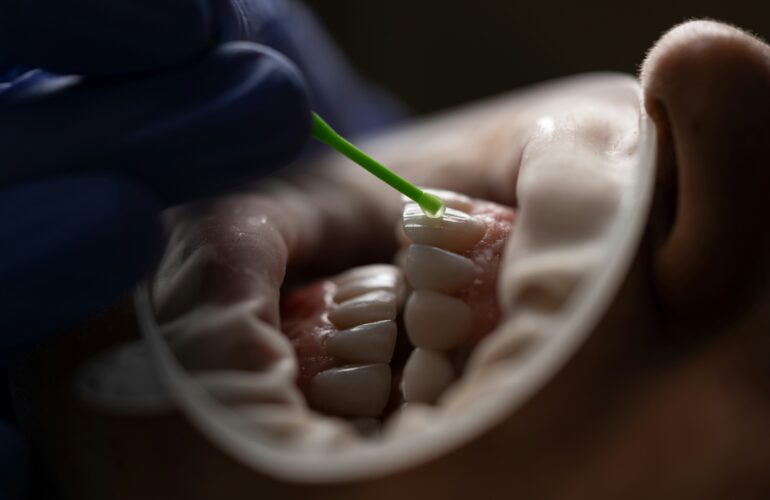In our fast-paced lives, stress has become an inevitable companion. While we often associate stress with its impact on mental health, it’s crucial to recognize its profound effects on physical well-being, including oral health. Today we will explore the intricate relationship between stress and oral health, offering valuable coping strategies and dental care tips to mitigate the impact.
Understanding the Link: Stress and Oral Health
Stress manifests in various ways, and one of its channels is through oral health. The most common oral health issues associated with stress include:
- Bruxism (Teeth Grinding): Stress often manifests unconsciously through teeth grinding or clenching, a condition known as bruxism. This can lead to excessive wear on the teeth, jaw pain, and even headaches.
- Gum Disease: Chronic stress weakens the immune system, making the gums more susceptible to infections. This can contribute to the development or exacerbation of gum diseases like gingivitis and periodontitis.
- TMJ Disorders: Stress-induced jaw clenching can lead to temporomandibular joint (TMJ) disorders, causing pain and discomfort in the jaw joint.
- Canker Sores and Cold Sores: Stress may trigger the development of canker sores or exacerbate outbreaks of cold sores, causing discomfort and pain.
Coping Strategies for Stress:
- Stress Management Techniques: Engage in stress-reducing activities such as deep breathing, meditation, yoga, or mindfulness exercises to alleviate overall stress levels.
- Regular Exercise: Physical activity is a powerful stress-reliever. Incorporate regular exercise into your routine to promote both mental and physical well-being.
- Adequate Sleep: Ensure you get sufficient and restful sleep, as lack of sleep can exacerbate stress and contribute to oral health issues.
- Healthy Diet: Maintain a balanced and nutritious diet to support your body’s overall health, including your oral health.
Dental Care Tips for Stress-Related Oral Health Issues:
- Custom Mouthguards: For individuals experiencing bruxism, wearing a custom-fitted mouthguard at night can help protect the teeth from grinding.
- Regular Dental Check-ups: Schedule regular dental check-ups to monitor your oral health. Early detection and intervention can prevent minor issues from escalating.
- Oral Hygiene Routine: Adhere to a consistent oral hygiene routine of brushing, flossing, and using an antiseptic mouthwash to prevent gum disease and maintain overall oral health.
- Stress-Awareness: Be aware of your stress levels and take proactive steps to manage stress. Recognizing stress triggers can help you address them before they impact your oral health.
- TMJ Exercises: If stress contributes to TMJ disorders, your dentist may recommend specific jaw exercises to alleviate tension and improve jaw mobility.
- Topical Treatments: Utilize over-the-counter or prescribed topical treatments for canker sores or cold sores to alleviate discomfort and speed up the healing process.
Stress management is a holistic approach that not only benefits your mental and physical health but also plays a pivotal role in maintaining optimal oral health. By incorporating stress-reducing practices and following dental care tips, you can protect your smile from the adverse effects of stress. Prioritize self-care, and let your oral health be a reflection of your overall well-being. Remember, a healthy smile begins with a healthy mind and body




